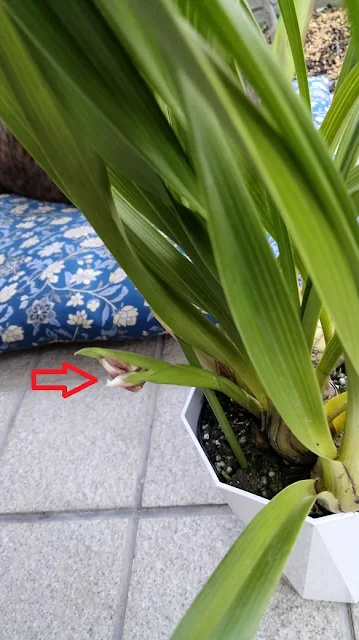この記事を載せたあと、ブログ友の「海月ファーム」さんからのご指摘で、写真の庭木は、実はキンモクセイではなく「ウスギモクセイ」であることがわかりました。新たなことを学べました。海月さん、ありがとうございます。
After I posted the article below, a blog friend of mine contacted me to say that the trees in the photos are called Osmanthus fragrans var thunbergi, rather than the Osmanthus proper. Thanks to her, I have learned something new.
___________________________
今朝のタイガは住宅街の方角を選んだので、歩きなれた道を散策していたら新たな発見をしました。ある民家の庭先にキンモクセイの木が2本植わっていて、そのいずれにも実が生っていたのです。
Taiga wanted to walk through the neighbourhood this morning instead of going to the park. As we were ambling through the familiar streets, I noticed something quite new. The two Osmanthus (fragrant olive) trees in a private garden had fruits on them.
冬の剪定が終わって実がむき出しになっていたので気づきました。そこで思い出したのが、キンモクセイの英語の呼び方のひとつに、fragrant olive というのがあることです。今まで「オリーブ」という表現を怪訝に思っていましたが、これらの実はオリーブの幼果にそっくりです。キンモクセイの実は食べられないことは無いそうで、花と同じ香がするそうですが、私はイメージ的にスルーです。少なくとも、これからは迷わずにfragrant oliveと呼ぶことができます。昔読んだ記事では、日本に入ってきたキンモクセイは花着きのよい雄木だけなので、キンモクセイに実が生っている風景は見られない、というような内容がありました。この家のは2本とも雌木ということなのでしょうか。
It has always been said that fragrant olive trees growing in Japan are all male trees and, therefore, one never sees a fragrant olive tree with fruits. Apparently, when the species was introduced to Japan, only male trees were brought in because male trees get more flowers than female trees. Therefore, both of these two fragrant olive trees must be very rare female trees.
At any rate, having seen these fruits looking very much like young olive fruits, I now know why one of the names is 'fragrant olive' tree (I used to find the name very strange).
値段に影響されやすい私は、とうとうテーブルシンビジュームも1苗買ってしまいました。もうあのJAの温室へは行きません。
I saw this 'table' cymbidium this morning and could not resist. The leaves are much more compact than those of the two normal-sized plants I bought about a month ago. The flowers are also smaller and looking very delicate and modest.
The delicate look of the flowers reminds me of Japanese orchids that come into season during February-March.
開花中の2本の茎に加え、蕾の茎が2本あります。で、あまり露骨に言及したくないけど、気になる人には気になる値段の話ですが、この苗とピンクの花の苗は同じ1,800円でした。黄花のジャイアント苗は2,000円でした。
In addition to the two flowering stems, this plant has two more stems with flower buds.
部屋に入れる前にしばらくバケツ水につけて潅水。
I soaked the plant in a bucket of water before taking it inside.
おじぎ姿になったら、水彩画に描いてみたくなるような控えめな雰囲気。
黄色のジャイアント苗との比較はこう。テーブルの花茎は細いので、次回の開花時にはワイヤーで胡蝶蘭のようにおじぎする格好に調教すれば、コンパクトな草姿になりそうです。
A comparison between today's plant and the normal-sized cymbidium. The flower stems of the table cymbidium are fine and delicate, which means I will be able to bend them forward to show off the flowers with next season's stems. Then, the whole plant will be looking much more compact, true to the name of 'table' cymbidium.
黄色の苗は2階部屋へ上げて、それがあった場所に今日の苗を置きました。以前の威圧感がなくなって、スッキリ気分でテレビを見られます。
With this smaller pot sitting where the giant yellow plant used to be, the plants are no longer oppressive. The giant plant is now sitting in a room upstairs where it gets full sun.
If I can bend the next season's flower stems forward, they will be an ideal material for water colour painting.
昨日から乾燥させておいた鶏ササミのスライスが、おやつらしい状態になってきました。
Taiga's treat with chicken sasami is done, hanging in the extremely dry air on the balcony.
今日も1にち晴天だったので、カリカリに乾燥しています。電気を使わずこれほど簡単に作れるものなら、冬のうちにたくさん作っておいて冷凍保存すれば長く使えそうです。
今日も1にち晴天だったので、カリカリに乾燥しています。電気を使わずこれほど簡単に作れるものなら、冬のうちにたくさん作っておいて冷凍保存すれば長く使えそうです。














